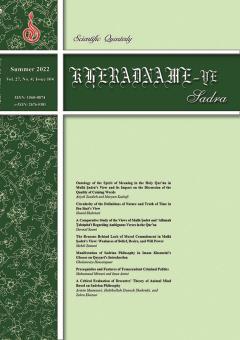A Critical Evaluation of Descartes’ Theory of Animal Mind Based on Sadrian Philosophy
Subject Areas : ملاصدراپژوهی و اندیشۀ حکمت متعالیهArmin Mansouri 1 , Habibullah Danesh Shahraki 2 * , zahra khazaie 3
1 - PhD candidate of Islamic Philosophy and Kalam, University of Qom, Qom, Iran
2 - Assistant Professor, Department of Islamic Philosophy and Kalam, University of Qom, Qom, Iran
3 - Professor, Department of Islamic Philosophy and Kalam, University of Qom, Qom, Iran
Keywords: Mind, soul, animal machine hypothesis, Ideal immateriality, Descartes, Mullā Ṣadrā,
Abstract :
Immaterial spiritual life for animals and their possession of mental capabilities have always been a controversial topic for debate among philosophers. The existence of certain similarities between animals and human beings, irrespective of all their differences, has made it difficult to provide an accurate explanation of the quality of animal life. Given his belief in the existence of two corporeal and immaterial intellectual substances for human beings, Descartes negates the existence of thought and intellection in animals for three reasons: lack of language, lack of creativity, and lack of awareness in animals. In other words, he only accepts the existence of corporeal life for animals and, thus, views animals as complex machines that lack mental life. This idea of Descartes is known as the “animal machine” notion. However, Mullā Ṣadrā analyzes animals in relation to the three material, Ideal, and intellectual levels of the world. Accordingly, he believes in the ideal immateriality of animal souls and explains mindfulness at the animal level based on this belief. Descartes’ animal machine hypothesis and the related three reasons are rejected based on the Ideal immateriality that Mullā Ṣadrā proves for animal souls.
دكارت، رنه (1381) تأملات در فلسفه اولي، ترجمة احمد احمدي، تهران: سمت. دكارت، رنه (1396) گفتار در روش راه بردن عقل، ترجمة محمدعلي فروغي، تهران: علمي و فرهنگي.
ريونزكرافت، ايان (1398) فلسفه ذهن، يك راهنماي مقدماتي، ترجمة حسين شيخرضايي، تهران: صراط.
طباطبايي، سيدمحمدحسين (1392) نهاية الحكمة، قم: انتشارات اسلامي.
عبوديت، عبدالرسول (1395) درآمدي به نظام حكمت صدرايي، ج3، تهران: سمت.
كاتينگهام، جان (1379) «گفتوگو با جان كاتينگهام دربارة دكارت»، ترجمة مرتضي فتحيزاده، پژوهشهاي فلسفي كلامي، سال دوم، شمارة 5، ص71ـ49.
مسلين، كيت (1391) درآمدي به فلسفه ذهن، ترجمة مهدي ذاكري، قم: پژوهشگاه علوم و فرهنگ اسلامي.
ملاصدرا (1366) شواهد الربوبيه، ترجمه و تفسير جواد مصلح، تهران: سروش.
ملاصدرا (1382) الحكمة المتعالية في الاسفار الاربعة، ج9، تصحيح و تحقيق رضا اكبريان، تهران: بنياد حكمت اسلامي صدرا.
ملاصدرا (1383 الف) الحكمة المتعالية في الاسفار الاربعة، ج1، تصحيح و تحقيق غلامرضا اعواني، تهران: بنياد حكمت اسلامي صدرا.
ملاصدرا (1383 ب) الحكمة المتعالية في الاسفار الاربعة، ج3، تصحيح و تحقيق مقصود محمدي، تهران: بنياد حكمت اسلامي صدرا.
ملاصدرا (1386) مفاتيح الغيب، تصحيح و تحقيق نجفقلي حبيبي، تهران: بنياد حكمت اسلامي صدرا.
موسوي، هادي (1396) مسئلة نفس و بدن در حكمت صدرايي، با نگاهي به نوخاستهگرايي، قم: دفتر تبليغات اسلامي.
Descartes, René (1985). The Philosophical Writings of Descartes, vol., trans. by J. Cottingham, R. Stoothoff, and D. Murdoch, Cambridge: Cambridge University Press.
Descartes, René (1991). The Philosophical Writings of Descartes, vol. 3, J. Cottingham, D. Murdoch, R. Stoothoff, and A. Kenny, (eds.), Cambridge: Cambridge University Press.

